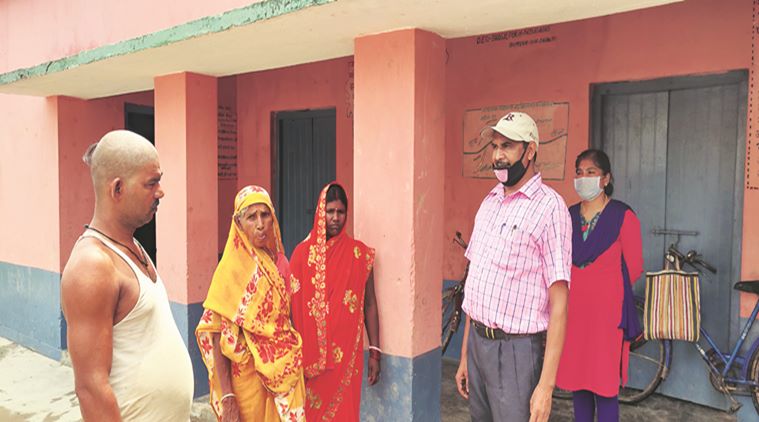 Some parents with the principal and staff of the primary school in Shahabad. (Express Photo/Dipankar Ghose)
Some parents with the principal and staff of the primary school in Shahabad. (Express Photo/Dipankar Ghose)
IN THE STAFF room of the Primary School in Shahabad, Principal Devendra Kumar Singh and teacher Juhi Kumari squinted into the smartphone to read the latest state government order on mid-day meals. Parents of at least three children from Badbilla who study in the school were waiting outside for details with news in the air that students will be provided ration in lieu of mid-day meals.
“We have been instructed to make a roster, and do things systematically. So, it will take a few days. Parents will be called to the school; your children will not have to come. The money will be sent straight to children’s accounts, while you will get the rice from here,” Principal Singh told the parents.
Bhagalpur series| As a district unlocks
On Monday, The Indian Express had reported how children of the Musahari tola in Badbilla village were pushed to rag-picking, leaving them starved after schools — which served them mid-day meals — had to shut down due to the Covid-19 pandemic. More than 115 lakh children in the state avail of the mid-day meal scheme.
Hours after the report, the Bihar government issued a statewide order stipulating that ration as well as money through Direct Benefit Transfer be provided to school children for 80 working days from May to July.
The order came even as the Patna High Court and the National Human Rights Commission (NHRC) took suo motu cognisance of The Indian Express report.
Reproducing the report in its order, a bench led by Chief Justice Sanjay Karol said the “news article highlights an issue of public importance and relevance. It concerns the welfare of children hailing from the lower most strata of society, the marginalised, the downtrodden…the disruption and closure of schools across the state will have a negative impact not just on the children’s right to education but also in specific cases, their right to adequate food.”
It said the Bihar government had undertaken to file an affidavit in two days, and suggested “perhaps for meeting minimum nutritional requirements of the child, anganwadi centres, or the schools can be opened up, for the limited purpose of providing food to the children”. The High Court also directed the state government to ensure that no child is “pushed into or indulges in any activity of rag picking or beggary, more so on the account of lack of food”, and also appointed amicus curiae in the case.
The NHRC issued notices to the Union HRD ministry and the Chief Secretary of the government of Bihar on Monday asking them to file replies in four weeks, stating this was a “serious issue of violation of human rights.”
On Tuesday, Principal Devendra Singh and teacher Juhi Kumari also walked the distance to the Musahari tola to inform them about the modalities of the scheme. “All parents who have children in this school between Class 1 and Class 8 will get 8 kilograms of rice and some money. Everyone should not come together. The government’s order is to call you separately and give the ration. We will send a message to all families about when to come,” he said.
Even as they spoke, Juhi Kumari was pulled aside by a woman from the tola, asking if she could register her child in the school.